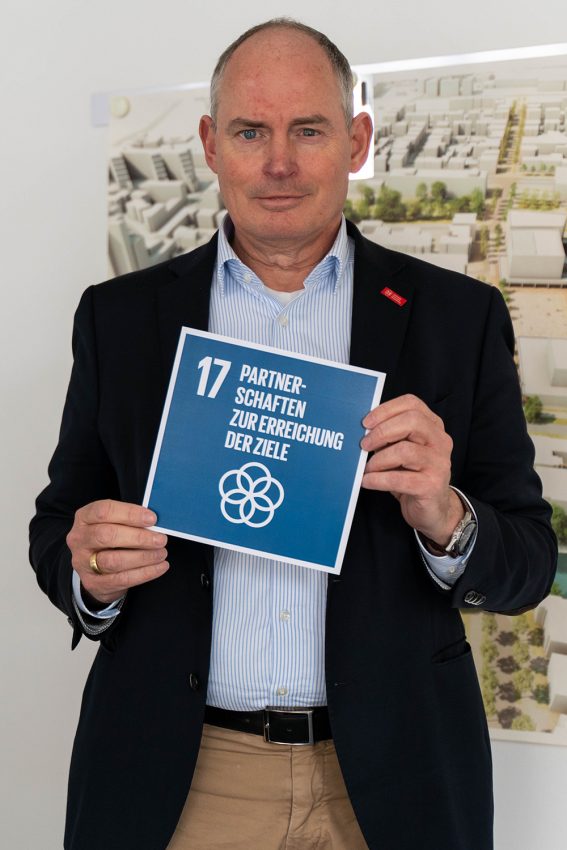Faces of Sustainability Green Office launches sponsorship programme on UN Sustainable Development Goals
In order to ensure a life in dignity for every person in the world by 2030, the United Nations adopted 17 Sustainable Development Goals (SDGs) in 2015. 193 countries have committed themselves to combating poverty and inequality, providing education for all, and ensuring sustainable economic development. TU Braunschweig will also have to make its contribution to global justice and sustainable development. The Green Office has therefore launched a sponsorship programme.

Vice-President Dietmar Smyrek has taken on the sponsorship of SDG 17 “Partnerships for the goals”. Photo credit: Linus Faymonville/TU Braunschweig
“Societally, the SDGs play a major role, even if they are still unknown to many people. After all, they are global goals that were formulated by the United Nations within the 2030 Agenda. They are addressed to everyone: to states, to companies, to every single person on this planet and also to educational institutions,” explains Sira Möller, who coordinates the project in the Green Office together with Anne Scheler. “The SDGs show where there is still a need for action for sustainable development on our planet. Especially with such urgent tasks as combating the climate crisis, these targets make a lot of sense.” That is why it is not only important to work on the SDGs, but also to make them better known.
Raising awareness of global goals
This is precisely the aim of the Green Office’s sponsorship programme. For the duration of one year, 17 sponsors represent one of the abstract sustainability goals with their work and are to make it more tangible. Among other things, they present themselves, the goal and their work towards it in short interviews. The sponsors come from every status group at TU Braunschweig. Both professors and staff as well as students have taken on sponsorships. “For the selection of the sponsors, it was important that there was an overlap in terms of research, work or voluntary commitment. On the other hand, there had to be a willingness to go out into public for the respective SDG,” Möller reveals. For example, Vice President Dietmar Smyrek started with Sustainable Development Goal (SDG) No.17 “Partnerships for the goals”, followed by Professor Anja Jakobi, Head of the Institute of International Relations, for SDG 16 “Peace, justice and strong institutions”.
Vice-President Dietmar Smyrek on his role as SDG sponsor: “Even an educational and research institution has to face urgent challenges such as dealing with the causes and effects of climate change or the preservation of ecological diversity and become active. As SDG sponsors, we draw attention to the Sustainable Development Goals (SDGs) and their interconnectedness throughout the university and repeatedly call on us as a community to orient ourselves towards sustainability. An example of this includes my current call for ideas on how to save energy.”
On its website and Instagram page, the Green Office currently publishes weekly short interviews with the various sponsors from teaching, research and administration. The student sponsorships will follow in late summer. In addition, several meetups are planned to take place until March 2023, where the attending audience can exchange ideas about the SDGs with the sponsors. For students who want to get more involved with sustainability topics, the Green Office has also compiled a course catalogue on the contents of the global goals.
